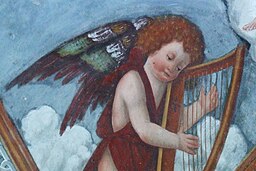Our previous study in Revelation chapter four directed our attention to the throne of God. Here now, in Revelation chapter five, we will be introduced to a mysterious scroll held by the One who sat upon that throne…
“Then I saw in the right hand of him who sat on the throne a scroll with writing on both sides and sealed with seven seals.
And I saw a mighty angel proclaiming in a loud voice, ‘Who is worthy to break the seals and open the scroll?’ But no one in heaven or on earth or under the earth could open the scroll or even look inside it. I wept and wept because no one was found who was worthy to open the scroll or look inside” (Revelation 5:1-4 NIV).
Much like a camera that zooms in on one aspect of an image, the beginning of our text from Revelation 5:1 shifts our attention to the right hand of God. This detail is rooted in an ancient symbol of power and dominion. Since the right hand serves as the dominant hand for most of the world’s population, this imagery grew to exemplify the idea of skill and/or strength.
This eventually led to a further association with the related concepts of sovereignty and dominion. The enduring legacy of this ancient metaphor survives today in the idea of a trusted assistant who serves as the “right hand” of an authority figure. An individual who fits that description is someone who is as indispensable as that person’s own right hand.
 This passage then continues with an important detail regarding this scroll, for we are told that it was inscribed on both sides. Although ancient scrolls were typically single-sided, many commentators note that title deeds formed an exception. For instance, the inner portion of a title deed offered a description of the property in question. If a financial hardship led to the sale of that property, the amount owed and repayment terms were written on the outside. Once that information was transcribed, the scroll was refastened with strings and sealed with wax over the knots for security purposes.
This passage then continues with an important detail regarding this scroll, for we are told that it was inscribed on both sides. Although ancient scrolls were typically single-sided, many commentators note that title deeds formed an exception. For instance, the inner portion of a title deed offered a description of the property in question. If a financial hardship led to the sale of that property, the amount owed and repayment terms were written on the outside. Once that information was transcribed, the scroll was refastened with strings and sealed with wax over the knots for security purposes.
When the debtor’s financial situation improved, he or she could approach the elders of the city with a petition to repurchase the property. The elders would examine the document and approve the purchase if the debtor met the required obligation. But even if someone couldn’t afford to redeem his or her property, a family relative could step in and do it for them. We’ll consider the role of that relative and how it relates to our text from Revelation chapter five next.
Image Attribution: unbekannt, CC BY-SA 4.0, via Wikimedia Commons
“Then I saw in the right hand of him who was seated on the throne a scroll written within and on the back, sealed with seven seals. And I saw a mighty angel proclaiming with a loud voice, ‘Who is worthy to open the scroll and break its seals?’
And no one in heaven or on earth or under the earth was able to open the scroll or to look into it, and I began to weep loudly because no one was found worthy to open the scroll or to look into it” (Revelation 5:1-4 ESV).
An ancient debtor who lacked the financial resources needed to redeem a piece of property could turn to a relative to do so on his or her behalf. That relative was known as a Kinsman Redeemer. Anyone who aspired to fulfill that role had to meet three qualifications:
- He had to maintain a family relationship to the debtor.
- He had to possess the resources necessary to settle the debtor’s financial obligation.
- He had to express a willingness to act in that capacity.(1)
So what does this have to do with the scroll in the right hand of the One who sat upon this throne? Well, the double-sided inscription on this scroll suggests that it functioned as a legal document pertaining to property rights. If so, then we should consider the possibility that it served as a title deed to this world. Consider the following sequence of events in support of this idea:
- This world was “deeded” to Adam in the Garden of Eden when God directed him to subdue the Earth (Genesis 2:15-17).
- Adam forfeited that obligation (and those of his descendants) when he disobeyed God’s directive at His enemy’s behest (Genesis chapter three).
- Adam’s forfeiture enabled that enemy to assume property management responsibilities, so to speak. This explains why Satan is called “the god of this world” (2 Corinthians 4:3-4) and “the ruler of this world” (by Jesus) in John 12:31.
However, Revelation 5:2-4 alerts us to a seemingly insurmountable problem: “And I saw a strong angel, who shouted with a loud voice: ‘Who is worthy to break the seals on this scroll and open it?’ But no one in heaven or on earth or under the earth was able to open the scroll and read it. Then I began to weep bitterly because no one was found worthy to open the scroll and read it” (NLT).
So John, our author, wept with disappointment at the fact that no one seemed to possess the authority to break these seals. However, a Kinsman Redeemer was about to make His presence known.
(1) The most prominent Biblical illustration of the function of a Kinsman Redeemer appears in the Book of Ruth
“But one of the elders said to me, ‘Do not weep. Behold, the Lion of the tribe of Judah, the Root of David, has prevailed to open the scroll and to loose its seven seals’”
And I looked, and behold, in the midst of the throne and of the four living creatures, and in the midst of the elders, stood a Lamb as though it had been slain, having seven horns and seven eyes, which are the seven Spirits of God sent out into all the earth. Then He came and took the scroll out of the right hand of Him who sat on the throne” (Revelation 5:5-7).
As we move through our narrative in Revelation chapter five, it may be helpful to view this scene from the perspective of John, our author. For instance, John learned that the Lion of the tribe of Judah had prevailed to open the scroll possessed by the One who was seated on the throne. Given that description, John likely expected to encounter a being of immense power and strength. That assessment would prove accurate, but not in the way he may have expected.
For example, we’re told, “Then I saw a Lamb, looking as if it had been slain, standing at the center of the throne…” (NIV). This was far from the image of a powerful lion. Nevertheless, this reference is more readily understood when we remember that the New Testament often portrays Jesus as a lamb. More than two dozen of those references appear in the book of Revelation alone. He also functions as the Kinsman Redeemer for humanity referenced earlier.
While we may ordinarily sympathize with a lamb that appeared as if it had been slain, this Lamb was different: “He had seven horns and seven eyes, which are the seven spirits of God sent into all the earth” (CSB). This brings us to another interpretive crossroad within the book of Revelation, for each reader must prayerfully determine how to understand and apply this passage.
![]() Many artistic renderings of these verses depict the lifelike image of a seven-eyed, seven-horned sacrificial lamb. But as we choose our interpretive path through the Book of Revelation, we should pause to remember that the number seven is often used to represent the idea of perfection or completion. This seems to present a better interpretive option as we consider this passage from Revelation 5:6.
Many artistic renderings of these verses depict the lifelike image of a seven-eyed, seven-horned sacrificial lamb. But as we choose our interpretive path through the Book of Revelation, we should pause to remember that the number seven is often used to represent the idea of perfection or completion. This seems to present a better interpretive option as we consider this passage from Revelation 5:6.
We should also avoid isolating this passage from its first-century historical context. From a first century perspective, the sight of an ox or bull with lethal horns presented a formidable image of power and strength. Thus, the word “horn” came to represent those qualities. The imagery of seven horns can thus be used to symbolize the idea of immeasurable power. In a similar manner, we can understand these references to “eyes” and the “seven Spirits of God” as symbolic references to the Lamb’s omniscience.
Image Attribution : Pratyya Ghosh, CC BY 3.0, via Wikimedia Commons
“And when he had taken it, the four living creatures and the twenty-four elders fell down before the Lamb. Each one had a harp and they were holding golden bowls full of incense, which are the prayers of the saints.
And they sang a new song: ‘You are worthy to take the scroll and to open its seals, because you were slain, and with your blood you purchased men for God from every tribe and language and people and nation. You have made them to be a kingdom and priests to serve our God, and they will reign on the earth” (Revelation 5:8-10 NIV).
 One of the more common illustrations of the heavenly realm features angelic beings who float among the clouds while gently strumming harps. That imagery is likely derived (at least in part) from our text here in Revelation 5:8. Nevertheless, this verse highlights an important element that we might easily overlook: the depiction of the prayers offered by God’s people as golden bowls filled with fragrant incense.
One of the more common illustrations of the heavenly realm features angelic beings who float among the clouds while gently strumming harps. That imagery is likely derived (at least in part) from our text here in Revelation 5:8. Nevertheless, this verse highlights an important element that we might easily overlook: the depiction of the prayers offered by God’s people as golden bowls filled with fragrant incense.
In an age where leftover meals are commonly stored in cheap plastic containers, this portrait of a golden bowl illustrates the tremendous value God places upon our prayers. In addition, the fact that God associates our petitions and intercessions with the pleasing aroma of sweet-smelling incense should encourage us to seek Him in prayer each day. As we do so, we have a fresh opportunity to contribute to the “prayerful incense” alluded to in this passage.
These verses also present us with another insight that holds significant implications: “…by your blood you ransomed people for God from every tribe and language and people and nation and you have made them a kingdom and priests to our God” (ESV). This portion of Scripture tells us that people from every societal demographic throughout human history will join their Creator in eternity.
Since no one can come to God the Father except through Christ (John 14:6), this can be challenging to reconcile with those people groups throughout history who have never heard of Jesus. The late Biblical scholar Dr. Norman Geisler helps brings clarity to that question…
“God has many ways to get the truth about salvation through Christ to those who seek Him. He can send a missionary (Acts 10), or a Bible (Ps. 119:130), give them a vision (Dan. 2:7), or send an angel (Rev. 14). But those who turn their back on the light they have (through nature) and find themselves lost in darkness, have no one to blame but themselves.” (1)
Image Attribution : Mattana, CC BY 2.0, via Wikimedia Commons
(1) Geisler, Dr. Norman. When Critics Ask : A Popular Handbook On Bible Difficulties [pg.29]
“You have made them to be a kingdom and priests to serve our God, and they will reign on the earth” (Revelation 5:10 NIV).
While the Biblical book of Revelation is widely recognized for its apocalyptic images of the future, there are certain portions of this book that are surprisingly practical. Jesus’ letters to the seven churches of Revelation chapters two and three represent one such portion. Our text from Revelation 5:10 represents another.
For instance, consider the passage quoted above: “You have appointed them as a kingdom and priests to serve our God, and they will reign on the earth” (NET). In contemporary terms, this passage tells us that God has appointed His people to intercessory responsibilities now and oversight responsibilities in the future.
 In light of those responsibilities, we would do well to consider the way we currently manage the blessings and opportunities God has given us today. For instance, a Christ-oriented life factors the following questions into the decision-making processes of daily living…
In light of those responsibilities, we would do well to consider the way we currently manage the blessings and opportunities God has given us today. For instance, a Christ-oriented life factors the following questions into the decision-making processes of daily living…
- Is this right in God’s view?
- Am I making good use of the talents, skills, and abilities God has given me?
- Am I acting as a good representative of Jesus Christ in the circumstances and situations I encounter?
This recalls the valuable counsel given to us in the New Testament book of Colossians: “Since, then, you have been raised with Christ, set your hearts on things above, where Christ is, seated at the right hand of God. Set your minds on things above, not on earthly things” (Colossians 3:1-2).
“Then I looked and heard the voice of many angels, numbering thousands upon thousands, and ten thousand times ten thousand. They encircled the throne and the living creatures and the elders. In a loud voice they sang: ‘Worthy is the Lamb, who was slain, to receive power and wealth and wisdom and strength and honor and glory and praise!’” (Revelation 5:11-12 NIV).
The number of angelic beings given to us here in Revelation 5:11 calculates to an incalculable number. But a reasonable estimate based on this passage may total well into the hundreds of millions. Yet even more significant than this sheer number of angelic beings is the song they sang in these verses: “…’The lamb who was slain deserves to receive power, wealth, wisdom, strength, honor, glory, and praise’” (GW).
Therefore, these angelic beings offer Jesus all the praise, honor, glory, and recognition He should have received during the period of His earthly ministry, but was denied.
Image Attribution : Manager by Nick Youngson CC BY-SA 3.0 Pix4free
“Then I heard every creature in heaven and on earth and under the earth and on the sea, and all that is in them, singing: ‘To him who sits on the throne and to the Lamb be praise and honor and glory and power, for ever and ever!’ The four living creatures said, ‘Amen,’ and the elders fell down and worshiped” (Revelation 5:13-14 NIV).
The final verses of Revelation chapter five conclude with the powerful image of these twenty-four elders falling in worship before the Lamb and the One seated upon the throne. Their act of reverence offers an opportunity to reflect upon the idea and meaning of “worship.”
“Therefore let us be grateful for receiving a kingdom that cannot be shaken, and thus let us offer to God acceptable worship, with reverence and awe” (Hebrews 12:28 ESV).
Our contemporary word “worship” is said to derive from the archaic phrase “worth-ship.” With this in mind, we can say that one fundamental aspect of worship involves the attribution of worth to someone or something. Thus, this word signifies a “condition of being worthy,” making it perfectly suited for use in relation to God. (1)
“Give unto the LORD the glory due to His name; worship the LORD in the beauty of holiness” (Psalm 29:2).
In a Biblical context, the word “worship” denotes an act of profound reverence and honor. It expresses an attitude that is characterized by an exceeding sense of respect and esteem, especially when used in reference to God. In Biblical usage, this word means, “to kiss the hand,” such as one might do for a person of royal birth today. (2) Therefore, a similar attitude of reverence and honor should identify those who claim to worship God.
“God is spirit, and his worshipers must worship in spirit and in truth” (John 4:24 NIV).
God is worthy of our worship because He is our Creator (see Genesis 1:27). We should worship God with honor, respect, and admiration because He is good, loving, and perfect (Jeremiah 29:11, 1 John 4:8, and Psalm 18:30). God is also deserving of our worship in light of the future He has prepared for those who love Him (see 1 Corinthians 2:9-10).
“…The Scriptures say, ‘Worship only the Lord God. Obey only him’” (Matthew 4:10).
A life that worships God is one that demonstrates respect for Him internally and externally. Thus, as we’re told in the Old Testament book of Psalms…
“Worship the Lord with the beauty of holy lives. Let the earth tremble before him” (Psalm 96:9).
(1) worthship – Oxford English Dictionary. (n.d.). https://www.oed.com/search/dictionary/?scope=Entries&q=worthship
(2) G4352 – proskyneo – Strong’s Greek Lexicon (kjv). (n.d.). Blue Letter Bible. https://www.blueletterbible.org/lexicon/g4352/kjv/tr/0-1/


